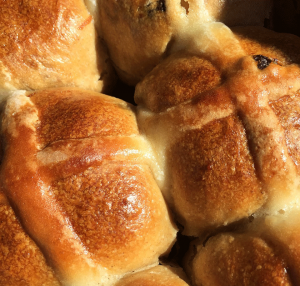Whilst you can enjoy being an Easter feaster this year, here’s how to keep your dog a happy bunny!
Chocolate eggs
 More and more people are aware that chocolate is toxic to dogs, but do they appreciate quite how poisonous it can be, and why? It is the component theobromine within cocoa that is the nasty culprit, dogs simply can’t metabolize it with appropriate speed (thank goodness we as humans can!). So theobromine remains in the bloodstream and develops to toxic levels playing havoc with a dog’s nervous system and heart.
More and more people are aware that chocolate is toxic to dogs, but do they appreciate quite how poisonous it can be, and why? It is the component theobromine within cocoa that is the nasty culprit, dogs simply can’t metabolize it with appropriate speed (thank goodness we as humans can!). So theobromine remains in the bloodstream and develops to toxic levels playing havoc with a dog’s nervous system and heart.
Even relatively meagre amounts of chocolate can cause death, especially in smaller dogs. However, the handy thing is that we have a reasonably good handle on how much cocoa it takes to harm a dog of a given size. Therefore, if you can find out how much cocoa a dog has consumed, any of our vets can indicate just how worried we should be and formulate an appropriate plan, which is likely to include making them vomit (it is important that you never make your dog vomit yourself). So what then, about white chocolate where cocoa content is low to nonexistent? There is still a good chance of causing digestive upset, and maybe even pancreatitis.
Should your dog get their greedy paws on your Easter eggs this year, remember, the sooner the veterinary intervention, the better the outcome is likely to be. So hide those treats well, because in the case of chocolate, prevention is always better cure…
…and all the more for us then!
Hot cross buns, not hot cross tums
 Just the thought of a toasted hot cross bun, slathered in melting butter is enough to get the taste buds tingling. Of course, your dog probably agrees! So how can such a tasty treat be so dangerous to dogs? It’s all about the currants in this case. Grape based products can contain toxins which attack the kidneys of dogs. This can lead to renal failure and even death.
Just the thought of a toasted hot cross bun, slathered in melting butter is enough to get the taste buds tingling. Of course, your dog probably agrees! So how can such a tasty treat be so dangerous to dogs? It’s all about the currants in this case. Grape based products can contain toxins which attack the kidneys of dogs. This can lead to renal failure and even death.
The interesting (and scary) thing about all grape products is that there is no strict rule on toxic doses. A small amount of raisins could indeed prove fatal to one dog, yet cause only moderate signs of poisoning to the next, and none at all to another. This is another instance where a zero risk policy is best. Once again, in the event that your dog gets their mucky paws on a hot cross bun or similar, phone for advice ASAP.
Easter Simnel cake
 Easter Simnel cake, another rich, fruity delight us humans enjoy at this time of year. But the list of dog-harmful contents within is likely to be extensive. We know there’s a problem with currants; almonds can be an issue too. While not strictly toxic to dogs, they can be hard to digest and cause stomach upset. The same applies to many of the other of the ingredients.
Easter Simnel cake, another rich, fruity delight us humans enjoy at this time of year. But the list of dog-harmful contents within is likely to be extensive. We know there’s a problem with currants; almonds can be an issue too. While not strictly toxic to dogs, they can be hard to digest and cause stomach upset. The same applies to many of the other of the ingredients.
The calorific tastiness of this treat, as with many others, is in part enhanced by high fat content and should your mischievous mutt get hold of a sizeable chunk, they are at risk of acute pancreatitis, a very painful condition that will likely result in a stay at the vets.
A final word on commercially prepared goodies, some contain Xylitol, a compound worth avoiding by dogs altogether. Even small amounts can cause very serious symptoms including hypoglycaemia (low blood sugar), liver failure and death.
Down in one!
An abundance of edible Easter treats generally means an abundance of packaging too. Ever caught your dog with something they know they shouldn’t have, and they’ve scoffed the lot before you can say ‘That’s still wrapped in plastic!’? Sadly, a hasty (or hungry) hound won’t likely take the time to distinguish between edibles and their packaging, and it’s this that can cause just as much bother.
The digestive system is a wonderful thing, but it meets its match when it comes to plastic which it simply won’t process. Worse, your dog could actually damage the gastrointestinal tract by consuming non-food items and could even require surgery to remove a life-threatening blockage.
We as vets brace ourselves over festive periods such as Easter, for just these types of emergencies, they truly seem to increase in frequency. In the event of any of the situations described, it is vital that you seek veterinary advice as soon as possible to ensure the best outcome for your dog. Enjoy your Easter treats, just remember to keep them to yourselves!
